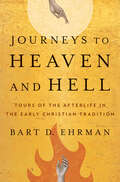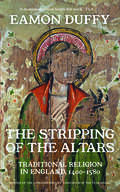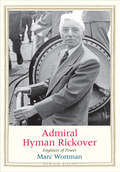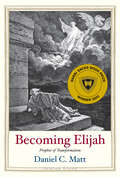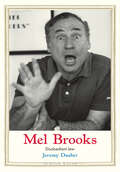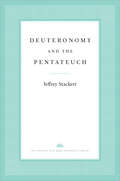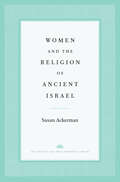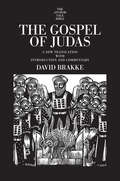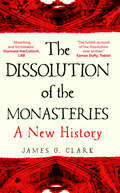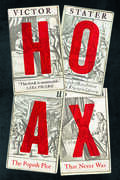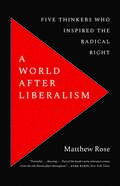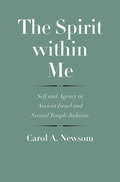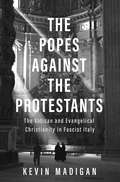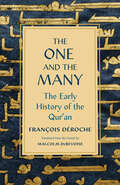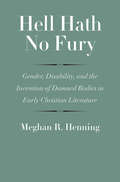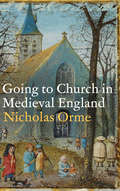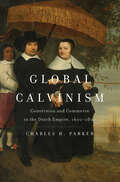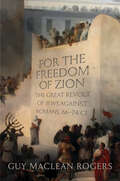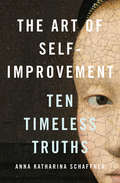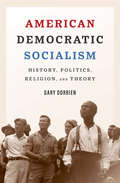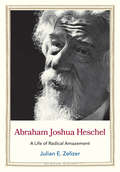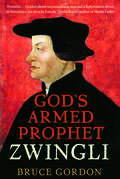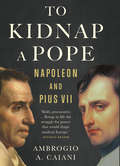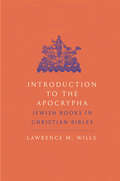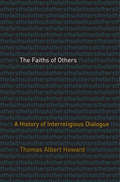- Table View
- List View
Journeys to Heaven and Hell: Tours of the Afterlife in the Early Christian Tradition
by Bart D. EhrmanA New York Times best-selling scholar's illuminating exploration of the earliest Christian narrated journeys to heaven and hell “[An] illuminating deep dive . . . An edifying origin story for contemporary Christian conceptions of the afterlife.”—Publishers Weekly From classics such as the Odyssey and the Aeneid to fifth-century Christian apocrypha, narratives that described guided tours of the afterlife played a major role in shaping ancient notions of morality and ethics. In this new account, acclaimed author Bart Ehrman contextualizes early Christian narratives of heaven and hell within the broader intellectual and cultural worlds from which they emerged. He examines how fundamental social experiences of the early Christian communities molded the conceptions of the afterlife that eventuated into the accepted doctrines of heaven, hell, and purgatory. Drawing on Greek and Roman epic poetry, early Jewish writings such as the Book of Watchers, and apocryphal Christian stories including the Acts of Thomas, the Gospel of Nicodemus, and the Apocalypse of Peter, Ehrman demonstrates that ancient tours of the afterlife promoted reflection on matters of ethics, faith, ambition, and life’s meaning, the fruit of which has been codified into Christian belief today.
The Stripping of the Altars: Traditional Religion in England, 1400-1580
by Eamon DuffyThis prize-winning account of the pre-Reformation church recreates lay people&’s experience of religion, showing that late-medieval Catholicism was neither decadent nor decayed, but a strong and vigorous tradition. For this edition, Duffy has written a new introduction reflecting on recent developments in our understanding of the period. &“A mighty and momentous book: a book to be read and re-read, pondered and revered; a subtle, profound book written with passion and eloquence, and with masterly control.&”—J. J. Scarisbrick, The Tablet &“Revisionist history at its most imaginative and exciting. . . . [An] astonishing and magnificent piece of work.&”—Edward T. Oakes, Commonweal &“A magnificent scholarly achievement, a compelling read, and not a page too long to defend a thesis which will provoke passionate debate.&”—Patricia Morison, Financial Times &“Deeply imaginative, movingly written, and splendidly illustrated.&”—Maurice Keen, New York Review of Books Winner of the Longman-History Today Book of the Year Award
Admiral Hyman Rickover: Engineer of Power (Jewish Lives)
by Marc WortmanA riveting exploration of the brilliant, combative, and controversial &“Father of the Nuclear Navy&” &“Marc Wortman delivers a 17-gun salute to this short, profane spitfire who pulled a reluctant Navy into the atomic era. . . . Wortman opens a window into the life of an intellectual titan disdainful of nearly everything except scientific honesty, his adopted nation, and the power of the atom.&”—Jonathan W. Jordan, Wall Street Journal &“A superb and even-handed treatment of a complex, brilliant, and driven admiral who inspired both awe and loathing across the Navy he fundamentally reshaped.&”—Admiral James Stavridis, former Supreme Commander, NATO, and author of 2034 Known as the &“Father of the Nuclear Navy,&” Admiral Hyman George Rickover (1899–1986) remains an almost mythical figure in the United States Navy. A brilliant engineer with a ferocious will and combative personality, he oversaw the invention of the world&’s first practical nuclear power reactor. As important as the transition from sail to steam, his development of nuclear-propelled submarines and ships transformed naval power and Cold War strategy. They still influence world affairs today. His disdain for naval regulations, indifference to the chain of command, and harsh, insulting language earned him enemies in the navy, but his achievements won him powerful friends in Congress and the White House. A Jew born in a Polish shtetl, Rickover ultimately became the longest-serving U.S. military officer in history. In this exciting new biography, historian Marc Wortman explores the constant conflict Rickover faced and provoked, tracing how he revolutionized the navy and Cold War strategy.
Becoming Elijah: Prophet of Transformation (Jewish Lives)
by Daniel C. MattThe story of the prophet Elijah&’s transformation from fierce zealot to compassionate hero and cherished figure in Jewish folklore &“In a series on Jewish Lives, this volume is about the Jewish life—the one that goes on forever. Becoming Elijah blends meticulous scholarship with bold literary and poetic imagination. Don&’t miss it!&”—Arthur Green, author of Judaism for the World "The author&’s erudite prose and masterful command of history and faith traditions bring his subject to vibrant life. This is an edifying and accessible chronicle of a towering religious figure."—Publishers Weekly, starred review In the Bible Elijah is a zealous prophet, attacking idolatry and injustice, championing God. He performs miracles, restoring life and calling down fire. When his earthly life ends, he vanishes in a whirlwind, carried off to heaven in a fiery chariot. Was this a spectacular death, or did Elijah escape death entirely? The latter view prevailed. Though residing in heaven, Elijah revisits earth—to help, rescue, enlighten, and eventually herald the Messiah. Because of his messianic role, Jews open the door for Elijah during each seder—the meal commemorating liberation from slavery and anticipating final redemption. How did this zealot turn into a compassionate hero—apparently the most popular figure in Jewish folklore? Becoming Elijah explores this question, tracing how Elijah develops from the Bible to Rabbinic Judaism, Kabbalah, and Jewish ritual (as well as Christianity and Islam). His transformation is pertinent and inspirational for our polarized, fanatical world.
Mel Brooks: Disobedient Jew (Jewish Lives)
by Jeremy DauberA spirited dive into the life and career of a performer, writer, and director who dominated twentieth-century American comedy Mel Brooks, born Melvin Kaminsky in Brooklyn in 1926, is one of the great comic voices of the twentieth century. Having won almost every entertainment award there is, Brooks has straddled the line between outsider and insider, obedient and rebellious, throughout his career, making out-of-bounds comedy the American mainstream. Jeremy Dauber argues that throughout Brooks&’s extensive body of work—from Your Show of Shows to Blazing Saddles to Young Frankenstein to Spaceballs—the comedian has seen the most success when he found a balance between his unflagging, subversive, manic energy and the constraints imposed by comedic partners, the Hollywood system, and American cultural mores. Dauber also explores how Brooks&’s American Jewish humor went from being solely for niche audiences to an essential part of the American mainstream, paving the way for generations of Jewish (and other) comedians to come.
Deuteronomy and the Pentateuch (The Anchor Yale Bible Reference Library)
by Jeffrey StackertThis indispensable monograph synthesizes current debates and offers a new historical and literary analysis of the book of Deuteronomy “In this exciting addition to the Anchor Yale Bible Reference Library, Stackert offers something genuinely new: he brilliantly weaves together biblical scholarship, cuneiform literature, and contemporary literary theory. This clearly written and engaging volume examines how the concept of scripture shaped ancient readers’ understanding of Deuteronomy.”—Bernard M. Levinson, University of Minnesota The book of Deuteronomy introduces and develops many of the essential ideas, events, and texts of both Judaism and Christianity, and it has thus been a resource—and in some instances even a starting point—for investigations of themes and concepts beyond it. In this volume, Jeffrey Stackert deftly guides the reader through major topics in the interpretation of Deuteronomy and its relationship to the other four pentateuchal books. Considering subjects such as the relationship between law and narrative, the role of Deuteronomy in Israel’s history, its composition and reception history, the influence of cuneiform legal and treaty traditions, textual and archaeological evidence from the Levant and Mesopotamia, and the status of Deuteronomy within the larger biblical canon, this book introduces ongoing debates surrounding the book of Deuteronomy and offers a contemporary evaluation of the latest textual and material evidence.
Women and the Religion of Ancient Israel (The Anchor Yale Bible Reference Library)
by Susan AckermanA synthetic reconstruction of women&’s religious engagement and experiences in preexilic Israel &“This monumental book examines a wealth of data from the Bible, archaeology, and ancient Near Eastern texts and iconography to provide a clear, comprehensive, and compelling analysis of women&’s religious lives in preexilic times.&”—Carol Meyers, Duke University Throughout the biblical narrative, ancient Israelite religious life is dominated by male actors. When women appear, they are often seen only on the periphery: as tangential, accidental, or passive participants. However, despite their absence from the written record, they were often deeply involved in religious practice and ritual observance. In this new volume, Susan Ackerman presents a comprehensive account of ancient Israelite women&’s religious lives and experiences. She examines the various sites of their practice, including household shrines, regional sanctuaries, and national temples; the calendar of religious rituals that women observed on a weekly, monthly, and yearly basis; and their special roles in religious settings. Drawing on texts, archaeology, and material culture, and documenting the distinctions between Israelite women&’s experiences and those of their male counterparts, Ackerman reconstructs an essential picture of women&’s lived religion in ancient Israelite culture.
The Gospel of Judas: A New Translation with Introduction and Commentary (The Anchor Yale Bible Commentaries)
by David BrakkeA new translation and commentary on the extracanonical Coptic text that describes Judas&’ special status among Jesus&’ disciples Since its publication in 2006, The Gospel of Judas has generated remarkable interest and debate among scholars and general readers alike. In this Coptic text from the second century C.E., Jesus engages in a series of conversations with his disciples and with Judas, explaining the origin of the cosmos and its rulers, the existence of another holy race, and the coming end of the current world order. In this new translation and commentary, David Brakke addresses the major interpretive questions that have emerged since the text&’s discovery, exploring the ways that The Gospel of Judas sheds light on the origins and development of gnostic mythology, debates over the Eucharist and communal authority, and Christian appropriation of Jewish apocalyptic eschatology. The translation reflects new analyses of the work&’s genre and structure, and the commentary and notes provide thorough discussions of the text&’s grammar and numerous lacunae and ambiguities.
The Dissolution of the Monasteries: A New History
by James ClarkThe first account of the dissolution of the monasteries for fifty years—exploring its profound impact on the people of Tudor England "This is a book about people, though, not ideas, and as a detailed account of an extraordinary human drama with a cast of thousands, it is an exceptional piece of historical writing."—Lucy Wooding, Times Literary Supplement Shortly before Easter, 1540 saw the end of almost a millennium of monastic life in England. Until then religious houses had acted as a focus for education, literary, and artistic expression and even the creation of regional and national identity. Their closure, carried out in just four years between 1536 and 1540, caused a dislocation of people and a disruption of life not seen in England since the Norman Conquest. Drawing on the records of national and regional archives as well as archaeological remains, James Clark explores the little-known lives of the last men and women who lived in England’s monasteries before the Reformation. Clark challenges received wisdom, showing that buildings were not immediately demolished and Henry VIII’s subjects were so attached to the religious houses that they kept fixtures and fittings as souvenirs. This rich, vivid history brings back into focus the prominent place of abbeys, priories, and friaries in the lives of the English people.
Hoax: The Popish Plot that Never Was
by Victor StaterThe extraordinary story of the Popish Plot and how it shaped the political and religious future of Britain In 1678, a handful of perjurers claimed that the Catholics of England planned to assassinate the king. Men like the &“Reverend Doctor&” Titus Oates and &“Captain&” William Bedloe parlayed their fantastical tales of Irish ruffians, medical poisoners, and silver bullets into public adulation and government pensions. Their political allies used the fabricated plot as a tool to undermine the ministry of Thomas Lord Danby and replace him themselves. The result was the trial and execution of over a dozen innocent Catholics, and the imprisonment of many more, some of whom died in custody. Victor Stater examines the Popish Plot in full, arguing that it had a profound and lasting significance on British politics. He shows how Charles II emerged from the crisis with credit, moderating the tempers of the time, and how, as the catalyst for the later attempt to deny James II his throne through parliamentary action, it led to the birth of two-party politics in England.
A World after Liberalism: Philosophers of the Radical Right
by Matthew RoseA bracing account of liberalism&’s most radical critics, introducing one of the most controversial movements of the twentieth century In this eye-opening book, Matthew Rose introduces us to one of the most controversial intellectual movements of the twentieth century, the &“radical right,&” and discusses its adherents&’ different attempts to imagine political societies after the death or decline of liberalism. Questioning democracy&’s most basic norms and practices, these critics rejected ideas about human equality, minority rights, religious toleration, and cultural pluralism not out of implicit biases, but out of explicit principle. They disagree profoundly on race, religion, economics, and political strategy, but they all agree that a postliberal political life will soon be possible. Focusing on the work of Oswald Spengler, Julius Evola, Francis Parker Yockey, Alain de Benoist, and Samuel Francis, Rose shows how such thinkers are animated by religious aspirations and anxieties that are ultimately in tension with Christian teachings and the secular values those teachings birthed in modernity.
The Spirit within Me: Self and Agency in Ancient Israel and Second Temple Judaism (The Anchor Yale Bible Reference Library)
by Carol A. NewsomThe first full-length study of the evolution of self and agency in ancient Israelite anthropology Conceptions of &“the self&” have received significant recent attention in philosophy, anthropology, and cultural history. Scholars argue that the introspective self of the modern West is a distinctive phenomenon that cannot be projected back onto the cultures of antiquity. While acknowledging such difference is vital, it can lead to an inaccurate flattening of the ancient self. In this study, Carol A. Newsom explores the assumptions that govern ancient Israelite views of the self and its moral agency before the fall of Judah, as well as striking developments during the Second Temple period. She demonstrates how the collective trauma of the destruction of the Temple catalyzed changes in the experience of the self in Israelite literature, including first‑person-singular prayers, notions of self‑alienation, and emerging understandings of a defective heart and will. Examining novel forms of spirituality as well as sectarian texts, Newsom chronicles the evolving inward gaze in ancient Israelite literature, unveiling how introspection in Second Temple Judaism both parallels and differs from forms of introspective selfhood in Greco‑Roman cultures.
The Popes against the Protestants: The Vatican and Evangelical Christianity in Fascist Italy
by Kevin MadiganAn account of the alliance between the Catholic Church and the Italian Fascist regime in their campaign against Protestants Based on previously undisclosed archival materials, this book tells the fascinating, untold, and troubling story of an anti-Protestant campaign in Italy that lasted longer, consumed more clerical energy and cultural space, and generated far more literature than the war against Italy&’s Jewish population. Because clerical leaders in Rome were seeking to build a new Catholic world in the aftermath of the Great War, Protestants embodied a special menace, and were seen as carriers of dangers like heresy, secularism, modernity, and Americanism—as potent threats to the Catholic precepts that were the true foundations of Italian civilization, values, and culture. The pope and cardinals framed the threat of evangelical Christianity as a peril not only to the Catholic Church but to the fascist government as well, recruiting some very powerful fascist officials to their cause. This important book is the first full account of this dangerous alliance.
The One and the Many: The Early History of the Qur'an
by Francois DerocheA revelatory account of early Islam’s great diversity by the world’s leading scholar of early Qur’anic manuscripts“There is no one better placed than François Déroche to write the history—and tell the story—of how the Quran went from words uttered by Muhammad to inviolable canonical scripture. This is a meticulous, lucid, and fascinating book.”—Shawkat Toorawa, Yale University According to Muslim dogma, the recited and written text of the Qur’an as we know it today scrupulously reflects the divine word as it was originally sent down to Muhammad. An examination of early Islamic sources, including accounts of prophetic sayings, all of them compared with the oldest Qur’anic manuscripts, reveal that plurality was in fact the outstanding characteristic of the genesis and transmission of the Qur’an, both textually and orally. By piecing together information about alternative wordings eliminated from the canonical version that gradually came to be imposed during the first centuries of Islam, François Déroche shows that the Qur’an long remained open to textual diversity. Not only did the faithful initially adopt a flexible attitude toward the Qur’anic text, an attitude strikingly at odds with the absolute literalism later enforced by Muslim orthodoxy, but Muhammad himself turns out to have been more concerned with the meaning than the letter of the divine message.
Hell Hath No Fury: Gender, Disability, and the Invention of Damned Bodies in Early Christian Literature (The Anchor Yale Bible Reference Library)
by Meghan R. HenningThe first major book to examine ancient Christian literature on hell through the lenses of gender and disability studies Throughout the Christian tradition, descriptions of hell&’s fiery torments have shaped contemporary notions of the afterlife, divine justice, and physical suffering. But rarely do we consider the roots of such conceptions, which originate in a group of understudied ancient texts: the early Christian apocalypses. In this pioneering study, Meghan Henning illuminates how the bodies that populate hell in early Christian literature—largely those of women, enslaved persons, and individuals with disabilities—are punished after death in spaces that mirror real carceral spaces, effectually criminalizing those bodies on earth. Contextualizing the apocalypses alongside ancient medical texts, inscriptions, philosophy, and patristic writings, this book demonstrates the ways that Christian depictions of hell intensified and preserved ancient notions of gender and bodily normativity that continue to inform Christian identity.
Going to Church in Medieval England
by Nicholas OrmeAn engaging, richly illustrated account of parish churches and churchgoers in England, from the Anglo-Saxons to the mid-sixteenth century Parish churches were at the heart of English religious and social life in the Middle Ages and the sixteenth century. In this comprehensive study, Nicholas Orme shows how they came into existence, who staffed them, and how their buildings were used. He explains who went to church, who did not attend, how people behaved there, and how they—not merely the clergy—affected how worship was staged. The book provides an accessible account of what happened in the daily and weekly services, and how churches marked the seasons of Christmas, Lent, Easter, and summer. It describes how they celebrated the great events of life: birth, coming of age, and marriage, and gave comfort in sickness and death. A final chapter covers the English Reformation in the sixteenth century and shows how, alongside its changes, much that went on in parish churches remained as before.
Global Calvinism: Conversion and Commerce in the Dutch Empire, 1600-1800
by Charles H. ParkerA comprehensive study of the connection between Calvinist missions and Dutch imperial expansion during the early modern period &“A tour de force offering the reader the best study of global Calvinism in the realms of the Dutch East India Company.&”—Ronnie Po-Chia Hsia, editor, Calvinism and Religious Toleration in the Dutch Golden Age Calvinism went global in the seventeenth and eighteenth centuries, as close to a thousand Dutch Reformed ministers, along with hundreds of lay chaplains, attached themselves to the Dutch East India and West India companies. Across Asia, Africa, and the Americas where the trading companies set up operation, Dutch ministers sought to convert &“pagans,&” &“Moors,&” Jews, and Catholics and to spread the cultural influence of Protestant Christianity. As Dutch ministers labored under the auspices of the trading companies, the missionary project coalesced, sometimes grudgingly but often readily, with empire building and mercantile capitalism. Simultaneously, Calvinism became entangled with societies around the world as encounters with indigenous societies shaped the development of European religious and intellectual history. Though historians have traditionally treated the Protestant and European expansion as unrelated developments, the global reach of Dutch Calvinism offers a unique opportunity to understand the intermingling of a Protestant faith, commerce, and empire.
For the Freedom of Zion: The Great Revolt of Jews against Romans, 66-74 CE
by Guy MacLean RogersA definitive account of the great revolt of Jews against Rome and the destruction of the Jerusalem Temple &“A lucid yet terrifying account of the 'Jewish War'—the uprising of the Jews in 66 CE, and the Roman empire&’s savage response, in a story that stretches from Rome to Jerusalem.&”—John Ma, Columbia University This deeply researched and insightful book examines the causes, course, and historical significance of the Jews&’ failed revolt against Rome from 66 to 74 CE, including the destruction of the Jerusalem Temple. Based on a comprehensive study of all the evidence and new statistical data, Guy Rogers argues that the Jewish rebels fought for their religious and political freedom and lost due to military mistakes. Rogers contends that while the Romans won the war, they lost the peace. When the Romans destroyed the Jerusalem Temple, they thought that they had defeated the God of Israel and eliminated Jews as a strategic threat to their rule. Instead, they ensured the Jews&’ ultimate victory. After their defeat Jews turned to the written words of their God, and following those words led the Jews to recover their freedom in the promised land. The war's tragic outcome still shapes the worldview of billions of people today.
The Art of Self-Improvement: Ten Timeless Truths
by Anna Katharina SchaffnerA brilliant distillation of the key ideas behind successful self-improvement practices throughout history, showing us how they remain relevant today Self-help today is a multi-billion-dollar global industry, one often seen as a by-product of neoliberalism and capitalism. Far from being a recent phenomenon, however, the practice of self-improvement has a long and rich history, extending all the way back to ancient China. For millennia, philosophers, sages, and theologians have reflected on the good life and devised strategies on how to achieve it. Focusing on ten core ideas of self-improvement that run through the world&’s advice literature, Anna Katharina Schaffner reveals the ways they have evolved across cultures and historical eras, and why they continue to resonate with us today. Reminding us that there is much to learn from looking at time-honed models, Schaffner also examines the ways that self-improvement practices provide powerful barometers of the values, anxieties, and aspirations that preoccupy us at particular moments in time and expose basic assumptions about our purpose and nature.
American Democratic Socialism: History, Politics, Religion, and Theory
by Gary DorrienA sweeping, ambitious history of American democratic socialism from one of the world&’s leading intellectual historians and social ethicists &“Dorrien is supremely qualified for the task he has set himself in this very thoughtful, necessary, and timely book.&”—Maurice Isserman, author of The Other American: The Life of Michael Harrington Democratic socialism is ascending in the United States as a consequence of a widespread recognition that global capitalism works only for a minority and is harming the planet&’s ecology. This history of American democratic socialism from its beginning to the present day interprets the efforts of American socialists to address and transform multiple intersecting sites of injustice and harm. Comprehensive, deeply researched, and highly original, this book offers a luminous synthesis of secular and religious socialisms, detailing both their intellectual and their organizational histories.
Abraham Joshua Heschel: A Life of Radical Amazement (Jewish Lives)
by Julian E. ZelizerA biography of the rabbi Abraham Joshua Heschel, who became a symbol of the marriage between religion and social justice &“When I marched in Selma, I felt my legs were praying.&” So said Polish-born American rabbi Abraham Joshua Heschel (1907–1972) of his involvement in the 1965 Selma civil rights march alongside Martin Luther King Jr. Heschel, who spoke with a fiery moralistic fervor, dedicated his career to the struggle to improve the human condition through faith. In this new biography, author Julian Zelizer tracks Heschel&’s early years and foundational influences—his childhood in Warsaw and early education in Hasidism, his studies in late 1920s and early 1930s Berlin, and the fortuitous opportunity, which brought him to the United States and saved him from the Holocaust, to teach at Hebrew Union College and the Jewish Theological Seminary. This deep and complex portrait places Heschel at the crucial intersection between religion and progressive politics in mid-twentieth-century America. To this day Heschel remains a symbol of the fight to make progressive Jewish values relevant in the secular world.
Zwingli: God's Armed Prophet
by F. Bruce GordonA major new biography of Huldrych Zwingli—the warrior preacher who shaped the early Reformation Huldrych Zwingli (1484–1531) was the most significant early reformer after Martin Luther. As the architect of the Reformation in Switzerland, he created the Reformed tradition later inherited by John Calvin. His movement ultimately became a global religion. A visionary of a new society, Zwingli was also a divisive and fiercely radical figure. Bruce Gordon presents a fresh interpretation of the early Reformation and the key role played by Zwingli. A charismatic preacher and politician, Zwingli transformed church and society in Zurich and inspired supporters throughout Europe. Yet, Gordon shows, he was seen as an agitator and heretic by many and his bellicose, unyielding efforts to realize his vision would prove his undoing. Unable to control the movement he had launched, Zwingli died on the battlefield fighting his Catholic opponents.
To Kidnap a Pope: Napoleon and Pius VII
by Ambrogio A. CaianiA groundbreaking account of Napoleon Bonaparte, Pope Pius VII, and the kidnapping that would forever divide church and state In the wake of the French Revolution, Napoleon Bonaparte, First Consul of France, and Pope Pius VII shared a common goal: to reconcile the church with the state. But while they were able to work together initially, formalizing an agreement in 1801, relations between them rapidly deteriorated. In 1809, Napoleon ordered the Pope&’s arrest. Ambrogio Caiani provides a pioneering account of the tempestuous relationship between the emperor and his most unyielding opponent. Drawing on original findings in the Vatican and other European archives, Caiani uncovers the nature of Catholic resistance against Napoleon&’s empire; charts Napoleon&’s approach to Papal power; and reveals how the Emperor attempted to subjugate the church to his vision of modernity. Gripping and vivid, this book shows the struggle for supremacy between two great individuals—and sheds new light on the conflict that would shape relations between the Catholic church and the modern state for centuries to come.
Introduction to the Apocrypha: Jewish Books in Christian Bibles
by Lawrence M. WillsAn ambitious introduction to the Apocrypha that encourages readers to reimagine what &“canon&” really means Challenging the way Christian and non-Christian readers think about the Apocrypha, this is an ambitious introduction to the deuterocanonical texts of the Christian Old Testaments. Lawrence Wills introduces these texts in their original Jewish environment while addressing the very different roles they had in various Christian canons. Though often relegated to a lesser role, a sort of &“Bible-Lite,&” these texts deserve renewed attention, and this book shows how they hold more interest for both ancient and contemporary communities than previously thought.
The Faiths of Others: A History of Interreligious Dialogue
by Thomas Albert HowardThe first intellectual history of interreligious dialogue, a relatively new and significant dimension of human religiosity In recent decades, organizations committed to interreligious or interfaith dialogue have proliferated, both in the Western and non‑Western worlds. Why? How so? And what exactly is interreligious dialogue? These are the touchstone questions of this book, the first major history of interreligious dialogue in the modern age. Thomas Albert Howard narrates and analyzes several key turning points in the history of interfaith dialogue before examining, in the conclusion, the contemporary landscape. While many have theorized about and practiced interreligious dialogue, few have attended carefully to its past, connecting its emergence and spread with broader developments in modern history. Interreligious dialogue—grasped in light of careful, critical attention to its past—holds promise for helping people of diverse faith backgrounds to foster cooperation and knowledge of one another while contributing insight into contemporary, global religious pluralism.
